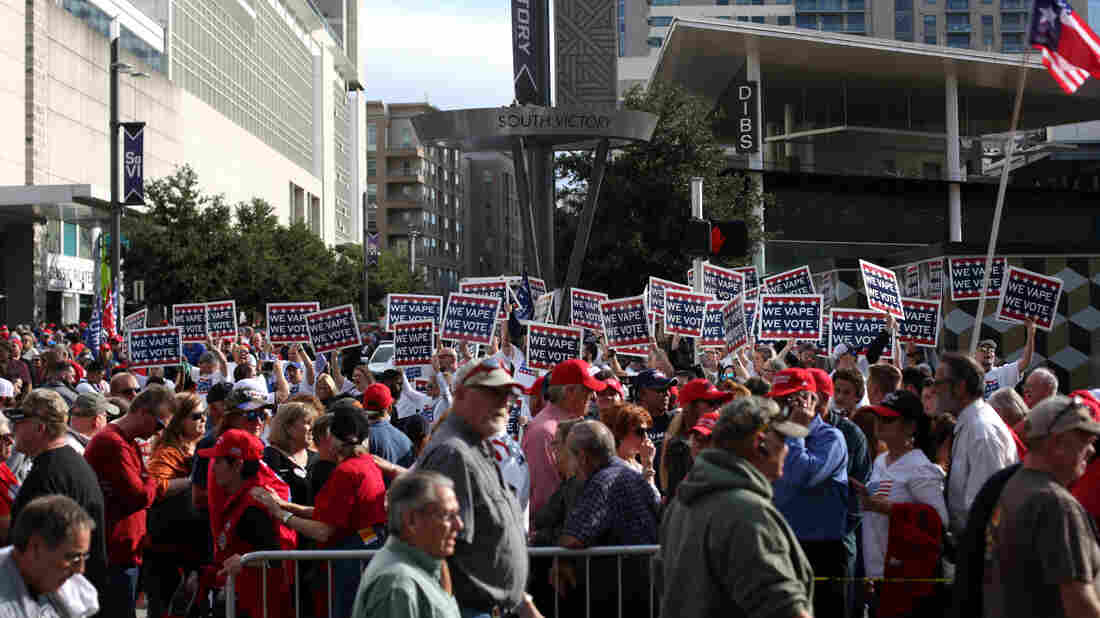Trump Administration’s Efforts To Ban Most Flavored Vaping Products Have Stalled Out
The White House is apparently backpedaling on its plan to ban most flavors in vaping products. The proposed FDA rule is unpopular with vape shop owners, and that’s creating political blowback.
ARI SHAPIRO, HOST:
The Trump administration’s efforts to ban most flavored vaping products have stalled out. The president announced two months ago that he would do something to address the youth vaping epidemic. A plan was supposed to have been announced in a matter of weeks. NPR science correspondent Richard Harris explains what happened instead.
RICHARD HARRIS, BYLINE: When President Trump said he was endorsing a Food and Drug Administration proposal to ban most flavored vaping products, he acknowledged there were some economic consequences.
(SOUNDBITE OF ARCHIVED RECORDING)
PRESIDENT DONALD TRUMP: Vaping has become a very big business, as I understand it – like, a giant business in a very short period of time. But we can’t allow people to get sick, and we can’t have our youth be so affected.
HARRIS: The policy proposal hit just as health officials were investigating lung injuries and deaths among people who vaped. Scientists now say that’s primarily from vaping dubious marijuana products. But Paul Billings at the American Lung Association was also focused on the role that flavored e-cigarettes played in teen nicotine addiction.
PAUL BILLINGS: We were very optimistic, encouraged when the president announced that he wanted to clear the markets of all flavored e-cigarettes that play such an important role in addicting millions of kids to these products.
HARRIS: That optimism started to fade after the policy did not appear as promised in the following weeks.
BILLINGS: It stretched into months. A package was sent to the White House for review, and then it cleared. And then everything stopped on November 5.
HARRIS: The Washington Post reports that’s when the president’s political staff advised him not to sign off on the new rules.
Paul Blair at the conservative group Americans for Tax Reform was part of the push against the new rules.
PAUL BLAIR: Look. There are legitimate concerns about teens experimenting with these products, but running towards the 1920s in terms of prohibition is a vote-losing issue.
HARRIS: That message hit the airwaves of Fox News, which ran commercials like this one.
(SOUNDBITE OF ARCHIVED RECORDING)
UNIDENTIFIED PERSON #1: If you enact a flavor ban, this will cost you the election.
UNIDENTIFIED PERSON #2: I vape, and I vote.
UNIDENTIFIED PERSON #3: Vapor Technology Association is responsible for the content of this advertising.
HARRIS: And advocates assert that a vaping flavor ban could tilt the election in close states against Trump. Blair’s organization polled people who vape in swing states like Michigan a few years back.
BLAIR: Three out of 4 of these adult consumers are single-issue voters.
HARRIS: And Blair says that issue is access to vaping, including flavored products. Some also argue that getting rid of flavored vaping products could drive people back to smoking cigarettes, which are the leading preventable cause of death in the United States. On top of that, Blair says the industry itself provides 150,000 jobs through vape shops and manufacturers.
BLAIR: It’d be a pretty significant hit in an election year for a guy that’s focused on deregulations, spurring economic growth and not killing jobs.
HARRIS: Big Tobacco is also part of the story, says Paul Billings at the American Lung Association.
BILLINGS: The largest tobacco companies in the world, like Altria and Reynolds, are major players in the e-cigarette business, along with these vape shops.
HARRIS: And these forces appear to have won out over the public health advocates. So Billings says the lead could well shift to states, counties and cities.
BILLINGS: And so we fully expect, irrespective of what the administration does or does not do, that states and localities will continue to move forward.
HARRIS: A White House spokesman says the new rules haven’t been killed, but it’s not clear what, if anything, will survive this process.
Richard Harris, NPR News.
(SOUNDBITE OF SMALL BLACK SONG, “SOPHIE”)
Copyright © 2019 NPR. All rights reserved. Visit our website terms of use and permissions pages at www.npr.org for further information.
NPR transcripts are created on a rush deadline by Verb8tm, Inc., an NPR contractor, and produced using a proprietary transcription process developed with NPR. This text may not be in its final form and may be updated or revised in the future. Accuracy and availability may vary. The authoritative record of NPR’s programming is the audio record.



